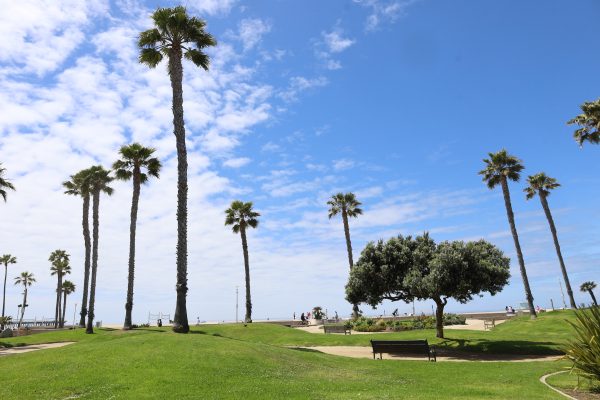by Gavin Heaney
Her hair shorn, clad in the traditional maroon and gold robes of an ordained Buddhist nun, Gen Tsoglam is a walking billboard for her tradition and is always something of a curiosity to passersby. “Dude! Are you wearing a skirt?!” A heckler once railed at her, mistaking her for male as she crossed a busy street in New York City. “That was the best one,” she said, beaming a contagious smile. “Sometimes people assume I have an odd fashion sense.”
For Gen Tsoglam, trying to make sense of her life is what set her on the path to becoming a nun. She currently teaches meditation at The Hermosa Beach Mahamudra Kadampa Buddhist Center. Her life with the Buddha began at childhood.
“My dad was in the army and I lived in Thailand when I was little, so I was exposed to Buddhism early on,” she said.
In her adult life she was trained as a Ringling Brothers circus clown and then a New York City chef, but those earIy imprints stayed with her as she searched to make sense and gradually, she became interested in meditation. “Like a lot of people, I was a seeker, “ she said. “I put my head in a lot of doors along the way, looking to see what do you have here? I really felt like there had to be some deeper meaning to life.”
The age-old existential quest of humanity, to find meaning and make sense of our existence, is a journey we must all make for ourselves. There is no ready answer from parents or teachers, no scientific explanation or internet search that can satisfy our inherent longing for a real, lasting meaning and to be free from our endless searching. Midway through her life’s journey, Gen Tsoglam had found herself in dark woods.
“The first time I went to a meditation center was because life had gotten really difficult and painful and it just kept getting worse and weirder and harder,” she said. “I finally just felt like I had hit the wall and I couldn’t solve this one. I’ve always been sort of a bootstraps kind of a person, but this time I just could not make sense of what was going on.”
Gen Tsoglam took up the offer from a friend to attend a meditation class and it clicked.
“The teachings I heard just made perfect sense,” she said. “I’ve found them very logical and I think they accord with a lot of people’s experience already, in many ways. I just kept finding answers, and was practicing very regularly and experiencing the benefits.”
For the first time in her life, Gen Tsoglam found a steady sense of purpose that gave her certainty in an uncertain world. “When I first expressed a wish to become a nun with our general spiritual director, our top nun, if you will, she told me, ‘You became a clown because you wanted to make people happy. Then you became a chef because you wanted to make people happy. And now you want to become a nun because you want to make people happy.’ She thought that it made perfect sense.”
“Happiness” and “Science” are two words that are thrown around so casually these days they have become subjectively slippery and presently we can’t seem to agree on what they mean anymore. Slogans like “Find Happiness Within” are mystically imparted on new age boutique sundries and “We Believe Science is Real” is signaled on countless yard signs. But what do these words actually mean? According to Gen Tsoglam, happiness is solely a state of mind. “Happiness is a calm and peaceful mind. The difficulty is that we only intellectually understand this,” she said. “We think happiness comes from this alchemy of externals such as having a good job, good health or a good partner and we spend most of our time trying to arrange these. By using the tool of meditation, we really start to get to know our mind. We start to understand how it works and how it is actually determining our happiness. In meditation, we are learning to take control of our mind by actively training and deciding what we want to think about in a given moment. Because if you check, if we’re having a rough day, our mind is uncontrolled, we just keep going back to the difficulty, whatever it is, we get stuck. So unless we carve out a little bit of time daily to work on our mind, actively training in paying attention to what we’re thinking about and letting go of thoughts that are not what we want to be thinking about at a given time, it is very hard to change our rote ways of relating and responding in daily life. Buddha would say, ‘Good day, bad day depends on your mind.’ If you have a good mind, you have a good day and that’s it.”
Happiness is subjective when we relate it to personal viewpoints, experiences, or perspectives, mistaking it as coming from external activities or objects. But for Gen Tsoglam, our happiness is always objectively coming from our mind.
“Some people love a beach vacation, other people want adventure, hiking or zip-lining,” she said, “But if you check, happiness is the state of mind itself. It is a light, joyful and comfortable mind. We mistakenly believe that it’s the activity or object making us happy, but from their own side, they have no power to make us happy. Happiness is solely experienced from our mind and nothing else. You can be on a tropical vacation and be miserable and you can be sitting in a rainstorm on the happiest day of your life.The external objects and experiences are not exclusive causes of our happiness and at best offer only diminishing returns.”

According to Gen Tsoglam, Buddhist meditation is more than just religion or philosophy, it is also a science of the mind. Science is by definition the systematic study of the structure and behavior of the physical and natural world through observation, experimentation, and the testing of theories against the evidence obtained. A theory must undergo the classic scientific method before it is proven to be valid, reliable or deemed factual. Possibly the most important aspect is that the results of an experiment must be reproducible by anyone.
“This is how we can come to understand the validity of meditation, by putting the methods into practice for ourselves.” Gen Tsoglam said. “We conduct our own experiments and experience the results first hand. Buddhist meditation techniques are scientific methods to help us improve the quality of our mind to help us revolutionize the way we think. Anybody can put these teachings into practice and benefit from them.”
“By practicing Buddhist methods for developing patience, for example, we can actually solve the problem of the irritating person or situations we encounter. In general, we think that stress comes from the stressful situation, that the stress is being impinged upon us and we have no choice but to respond by getting stressed. But the truth is, stress is a response and we have the freedom to respond in whatever way is most beneficial. For as long as we have the view that stress comes from the externals, we’re going to be a bit trapped.”
The puzzlement is understanding that the mind, while not physical, is still a real part of our world. Though we cannot see our mind, it is always appearing to us, and exists as a reality to each of us. This invisible mental world is only now being recognized as having a great effect on our physical well being. Advocating for mental health has become more of a priority these days, and meditation is finally being acknowledged as a primary medicine for a healthy mind.
“People always want a quick, easy fix, but the truth is, any sort of benefit that comes from those is generally only temporary relief, not a cure,” Gen Tsoglam said. “We’re not able to maintain any sort of lasting result because we’re not really addressing the functioning of our mind and changing it at a deeper level. We’re really trying to understand that ultimately we can attain happiness regardless of the externals if we train our mind in meditation. This is why happiness is said to come from within. It is very clear that although there are these massive leaps in technology and physical science, people are no happier. We really have to be working on our minds and that’s where meditation comes in. It is the actual method to bring real, lasting happiness to our lives.”
Gen Tsoglam will be giving a special talk and guided meditation on “The Science of Happiness” at The Hermosa Beach Community Center on September 30 at 5 p.m.











